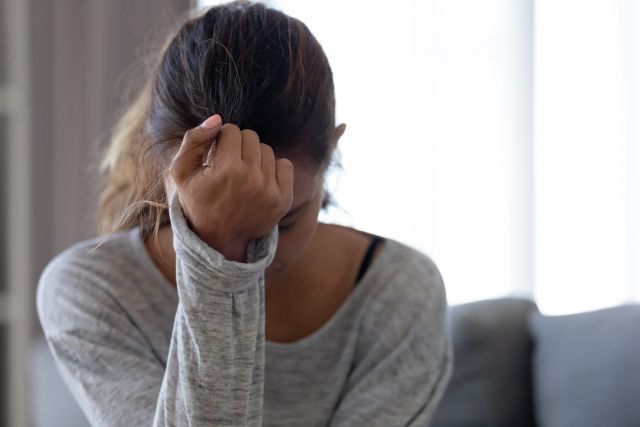Updated on November 28, 2022.
When life gets busy, feeling a little stressed (though unpleasant) can be helpful, motivating you to get things done. But over time, day-to-day stressors and struggles can leave you feeling overwhelmed or drained. Some days you may feel like you’re running on empty.
After a while, being tired and stressed may seem “normal.” But is it?
Many of the symptoms of fatigue or even burnout can overlap with depression. If the lines have blurred and you’re not sure if you’re stuck in a rut, rundown from a busy lifestyle—or depressed, there are steps you can take to figure it out and protect your mental and physical well-being.
Managing a slippery slope
Most people can expect to feel tired or overworked at some point. Daily stressors and lifestyle habits, like drinking caffeine or alcohol too close to bedtime, can contribute to poor sleep and fatigue.
Adults need at least seven hours of sleep each night, but 35.2 percent of U.S. adults are falling short. This can affect how the brain processes emotions and memories. Poor sleep can also contribute to stress and worsening mental health.
The causes of temporary fatigue, such as a tight deadline at work, can often be identified. And stress levels may drop as energy levels rise with fixes like meeting that deadline and catching up on sleep. But if the tiredness you’re experiencing is more like exhaustion and it’s persistent, you may be in a rut or even burned out.
Burnout can sneak up on you, developing gradually over time. A common cause is job stress or an imbalance between the demands of your work, family life, and restorative activities or rest. But almost anyone can become burned out, including those without careers outside the home, such as stay-at-home parents and caregivers.
Burnout can feel like deep, unrelenting fatigue that doesn’t go away—even after you’ve rested or tried remedies, like stress management techniques. It generally has three categories of symptoms:
- Exhaustion: feeling drained, unable to cope, emotionally exhausted
- Alienation from work-related activities: feeling cynical about work, feeling numb, or emotionally distant
- Reduced productivity: feeling listless or negative about tasks, difficulty concentrating, lacking creativity or motivation, feeling less accomplishment, or loss of personal identity
Your days may seem to run together, you may feel like you’re too tired to enjoy your free time, or you may start fantasizing about escaping from your life (not just taking a vacation). You may also experience anger, irritability, or impatience, as well as physical symptoms like pain, frequent headaches, and digestive symptoms, such as upset stomach.
Burnout can trigger a cascade of other issues that can affect your well-being, such as insomnia, relationship strife, and alcohol or substance misuse. It can also affect your physical health and increase your risk for heart problems, type 2 diabetes, a weakened immune system, and mental health problems—including depression.
In fact, some researchers contend that symptoms of burnout may overlap with depression. One 2021 study published in Assessment suggests that burnout and depression may be so closely related that differentiating between the two can be very challenging.
When fatigue signals depression
About one out of every six adults may experience depression at some point during their life. Feeling exhausted doesn’t necessarily mean you have the condition, but fatigue can be a warning sign.
Other symptoms of depression include:
- Feeling sad or irritable mood most of the time
- Sleeping too little or too much
- Changes in appetite, often accompanied by weight gain or loss
- Tiredness and lack of energy
- Feeling worthless, hopeless, or helpless
- Self-hate or guilt
- Difficulty concentrating
- Slow or fast movements
- Lack of pleasure in activities you usually enjoy
- Repeated thoughts of death or suicide
- Loss of touch with reality or hallucinations
To be diagnosed with depression, your symptoms must persist for at least two weeks. They also tend to be severe enough to interfere with the ability to perform routine daily tasks. Sometimes, however, symptoms associated with depression may be mild, or even subtle, explains Irvin Schonfeld, PhD, MPH, professor emeritus of psychology at The City College of the City University of New York in New York City.
“There’s two ways to look at depression: essentially as a diagnosis that’s present or absent or as something that’s on a continuum like temperature, from very low levels of symptoms ranging up to very high levels of symptoms,” Schonfeld says.
The mild, chronic cousin of depression is called dysthymia, or persistent depressive disorder (PDD). Dysthymia often goes undiagnosed because it doesn’t keep you from participating in life, but it can make you feel like the colors are muted.
The main symptom of dysthymia is a low, dark, or sad mood on most days for at least two years, although the intensity of symptoms can change over time. Those affected may also experience two or more of the following:
- Feeling hopeless or empty
- Getting too little or too much sleep
- Having low energy or fatigue
- Low self-esteem, self-criticism, feeling inadequate
- Anxiety, irritability, or excessive anger
- Decreased productivity or ability to make decisions
- Guilty feelings or worries about the past
- Low appetite or overeating
- Decreased concentration
- Loss of interest or avoidance of enjoyable activities
Dysthymia may not prevent people from going about their daily routine, but it can significantly interfere with their relationships, school, work, and certain activities. It can also increase the risk for substance abuse and suicide.
Because dysthymia symptoms can persist for so long, they may start to seem like they’re just part of life for those with the condition. For example, you may be able to get out of bed but you feel like you’re just going through the motions or “white knuckling it” through the day.
Even if you can get by, it’s important to recognize how you’re feeling. Depression isn’t a weakness. It’s not something that can be willed or wished away, but it can get better with the right treatment.
How to know if you need help
If your life seems generally hectic or overwhelming, it’s understandable if you’re unsure if the fatigue and other symptoms your experiencing are signs that you need a break and some extra sleep—or if you are experiencing a more serious health issue that should be treated.
And the truth is: You shouldn’t try to figure it out on your own.
If you are concerned about feeling tired a lot, or suspect that you may be burned out or depressed, talk to a healthcare provider (HCP) or a mental health professional. A trained expert should take a holistic view of you—your medical history, risk factors, and other aspects of your life—and decide if you could benefit from external support and treatment, Schonfeld says.
“In many cases, someone who doesn’t know they’re depressed finds out about it when they talk to their HCP about being fatigued or having sleep problems,” he points out.
The U.S. Preventive Services Task Force (USPSTF) recommends routine screening among adults for depression. In September 2022, the expert panel also issued draft recommendations for anxiety screening among all adults in a primary care setting—even among those who do not have symptoms. The Task Force noted the need for greater awareness of Americans' well-being has only intensified over the past few years.
That said, there are things you can do each day to support your mental health and regain energy, such as:
- Follow a diet rich in a range of fruits and vegetables as well as whole grains, healthy unsaturated fats, and lean protein, while limiting sugar, saturated fats, and red meat.
- Limit your alcohol intake. If you don’t drink, it’s best not to start. But if you do choose to drink, women should have no more than one drink per day and men should have no more than two.
- Don’t smoke or abuse drugs.
- Get regular exercise or simply move more each day in whatever ways you’re able.
- If you’re taking medications, check that you’re taking them correctly, and learn how to watch for worsening symptoms.
- Try to stick to a regular sleep routine, going to bed and waking up around the same time each day.
- Do what you can as you can. Set priorities and decide what you must do—and what you can set aside for another day.
- Reach out to other people for connection. Let the people you trust know how you are feeling.
- Seek out and accept help from others. If necessary, this includes talking to your supervisor, co-workers, a counselor, or your employee assistance program. You can also join a support group.
- Consider talk therapy like CBT (cognitive behavioral therapy), which can help you become more aware of your symptoms and re-train negative thought patterns. CBT can improve symptoms of a range of problems, including insomnia and a variety of mental health conditions.
- Try to learn and incorporate some relaxation techniques into your routine, such as meditation, mindfulness, and deep breathing exercises.
When to seek immediate medical attention
Call your HCP for immediate help if your symptoms are getting worse or affecting your daily activities, you hear voices that aren’t there, or you have concerns about drugs or alcohol.
If you or someone you know is thinking about suicide, call or text the national suicide and crisis lifeline for confidential support 24/7 day or night at 988 or chat 988lifeline.org. You can also call 1-800-273-8255 (1-800-273-TALK), call 911 or go to a hospital emergency room right away.
If someone you know has attempted suicide, call 911 or go to a hospital emergency room immediately. Do not leave the person alone even after you have called for help.







